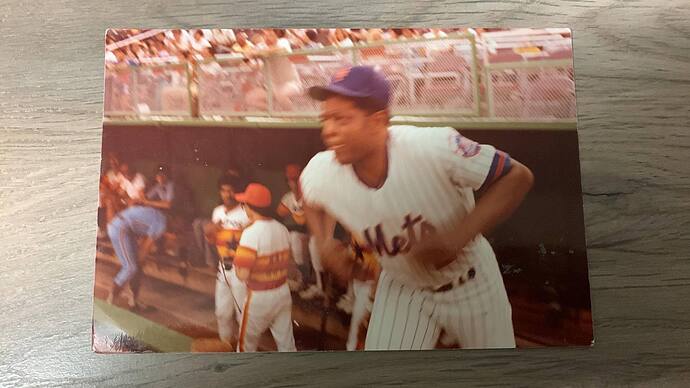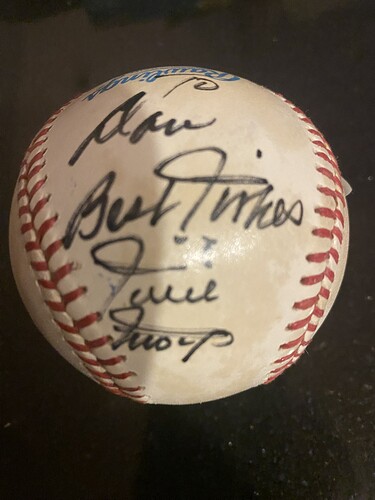I get emailed a weekly column by Reds author Chad Dotson (The Big 50). Here was this week’s entry:
Willie Mays passed away this week. RIP Legend.
When we were writing [The Big 50] one of my favorite chapters to research was about Eric Davis in 1987. Everyone in the baseball world was mesmerized by young Davis, and the quotes were completely over-the-top. It was awesome. Some examples:
“Eric Davis flat-out frightens me more than any player I’ve ever seen.”
–Tommy Lasorda, Dodgers manager
“There’s got to be a stick of dynamite in that body…. He’s got more talent in that body than any one player I’ve ever seen.”
–Reds pitcher Ron Robinson
“Nobody in this league has any more talent than Eric Davis,” said Giants manager Roger Craig. “He can hit the ball five hundred feet and run like a deer. He’s just like Hank Aaron when he came up.”
As we noted in the book, by far the most prevalent comparison for Davis was Willie Mays:
“Eric has more talent than any player I have ever seen in my life, including Willie Mays,” said Davis’ manager, Pete Rose. “I think everything said about him is justified.”
The previous August, the Reds were playing a series against the Giants in San Francisco’s old Candlestick Park. Mays just happened to be at the game, and Rose approached him. “I got a kid who can do all the things you could, Willie,” said Rose.
Mays squinted at Pete. “Where is he?”
When Davis, 6-foot-3 and rail-thin, walked over to be introduced, Mays was not particularly impressed. “I saw no similarities,” he said later. “Let the kid play. In the end, they’ll compare numbers on paper.”
For his part, Davis responded to the plaudits with his customary modesty. “Not even close,” says Davis. “I’ve got a long way to go. I’m being compared to the impossible…. Why not compare me to my peers?”
By May of 1987, Davis was leading the league in every major hitting category. He was hitting .411 with an on-base percentage of .475 and an almost-inconceivable slugging percentage of .900. He had 12 home runs, 27 RBI, 27 runs scored. And then the legend grew:
Just when it appeared things couldn’t get any better, Davis showed that he was more than just a power hitter. In Cincinnati’s next game, against the Mets in New York, Davis stole three bases and scored another run, but the big highlight came in the sixth inning. With the Reds clinging to a slim 1-0 lead, Davis’ childhood friend Darryl Strawberry launched a blast to deep left-center field. Davis sprinted back to the fence, near the 410-foot mark, leaped high into the air and reached over the wall. When he landed, the ball was in his glove for the third out of the inning.
“I didn’t think Superman could get to that ball,” said Rose. “I guess I forgot who was going after it.”
The following day, Willie Mays had reconsidered his position. “It’s an honor to be compared to Eric Davis,” Mays said. “I hope Eric is honored.”
Of course, we know Davis didn’t turn out to be Willie Mays. He’s the most talented player I’ve ever seen (well, until Elly De La Cruz showed up), but injuries limited his success. You know the story. He was really good. But he wasn’t Mays.
He was never going to be Mays, because no one was Mays. There’s a great argument that the Say Hey Kid was the best player ever to grace a baseball field. If there’s ever been a player I wish I could have seen play in person, it would be Johnny Bench. But that’s only because I’m a Reds homer. The real answer is Willie Mays. Can you imagine being able to watch him play?
When I read Joe Posnanski’s piece about Mays this week [in his indispensable newsletter], it reminded me of the Eric Davis chapter because of the over-the-top way people described Mays.
Listen to the awe of people who saw him play, even for a minute, people like Buck O’Neil, who said, “There were faster men, but not with a baseball in the air,” or listen to Durocher, who said Mays was the violin virtuoso Jascha Heifetz, the racehorse Nashua and Sammy Davis Jr. all rolled into one, or listen to the theater legend Ethel Barrymore, who said, “Isn’t Willie Mays wonderful?”
But while Davis was honored by comparisons to Mays, you’ll notice that none of his contemporaries compared Willie Mays to any other player. Because there was never a player like him that ever lived.

